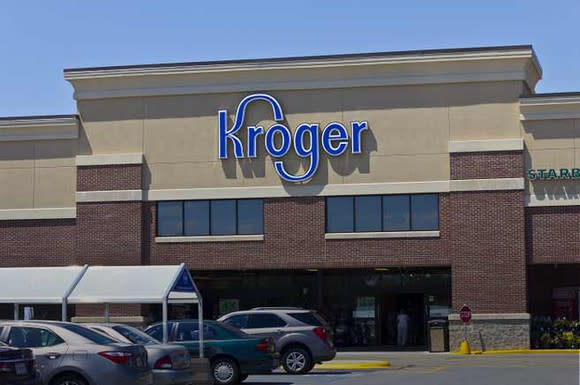Kroger Hunts for an E-commerce Acquisition, but It May Have the Wrong Target
It looks like Kroger (NYSE: KR) will be the next big retailer to buy its way into e-commerce.
Following Walmart's (NYSE: WMT) acquisition of Jet.com in 2016 and Target's (NYSE: TGT) takeover of Shipt late last year, the country's largest traditional grocer is reportedly mulling a bid for Overstock.com (NASDAQ: OSTK), or Boxed, a buy-in-bulk e-commerce retailer that competes with Costco (NASDAQ: COST).
According to Forbes, Boxed had received interest from Kroger, as well as other retailers, in a buyout that could cost as much as $500 million. Boxed sells bulk goods at low prices but without a membership fee, which separates it from the likes of Costco, Amazon Prime, and Walmart's Sam's Club. That has made it popular with millennials. Boxed was able to negotiate low prices by offering only one brand in each product category.
Separately, Kroger was also said to be pursuing Overstock.com -- The New York Post noted Overstock could sell its e-commerce business to Kroger after Overstock CEO Patrick Byrne said in December he wanted to ditch the retail side of the business and move into blockchain technology. Kroger stock reached an eight-month high on the reports.

Image source: Kroger.
No stranger to acquisitions
It's not surprising to see Kroger looking to bring an e-commerce company into the fold, as the supermarket giant has historically grown through acquisitions. In 2015, it acquired midwestern supermarket chain Roundy's for $500 million, which was followed by its 2017 acquisition of the Murray's Cheese brand, including its flagship New York store. Its biggest buyout in recent years came in 2014 with the takeover of upscale grocery chain Harris Teeter for $2.5 billion.
However, the rumors above make it clear that the company's next big play will be in online retail, not in brick-and-mortar, and that's understandable. Kroger has nearly 3,000 locations across the country, blanketing every region of the U.S. except for the Northeast, Florida, and the Upper Midwest. While acquiring a chain in one of those regions could make sense, an e-commerce acquisition is more in the company's interest in today's market.
Like Walmart, Kroger is investing heavily in its grocery pickup service, Clicklist, reaching 1,000 locations in December, up from 637 in Jan. 2017. It touted 109% digital revenue growth in its most recent quarter. Clearly, there's significant growth ahead in online grocery sales, and with Amazon's acquisition of Whole Foods, Walmart's takeover of Jet, and Target's deal with Shipt, Kroger doesn't want to be the only major player without a dance partner. Even Costco has expanded into e-commerce lately, partnering with Instacart to deliver perishables and offering free two-day shipping of nonperishables on orders over $75.
If the shoe fits
While the argument for Kroger partnering with an e-commerce company seems clear, Boxed and Overstock may not be the best fit for the grocer. Boxed has built a successful business shipping bulk orders of products like paper goods and snack foods, but perishables remain the biggest hurdle in online grocery. Boxed does nothing to solve that problem since it doesn't offer staples like produce, meat, or dairy, while perishables made up 24% of Kroger's revenue last year. The difficulty of delivering fresh foods explains why Amazon Fresh has struggled, forcing the acquisition of Whole Foods, and why Walmart and Kroger have turned to grocery pickup as a compromise solution. Customers can order online but still must visit a store, where an employee will place their order inside their car. The process eliminates the need to keep food at the right temperature while it sits on a doorstep.
Overstock, meanwhile, has been a historically weak business, failing to gain traction in e-commerce, despite being nearly as old as Amazon and eBay. Revenue actually declined by 4% in Overstock's most recent quarter, even though it competes in e-commerce, a sector that has consistently delivered 15% annual growth since the recession. Overstock won't even generate $2 billion in revenue this year, a pittance compared to the $122 billion Kroger is headed for. It's also unclear what Kroger would get in an Overstock acquisition besides e-commerce fulfillment centers. Overstock's retail business is weak, and the company specializes in selling home goods, not foodstuffs and consumables like paper products that make up Kroger's core business.
The logic in Kroger's rivals' recent deals is clear. Walmart bought Jet to gain access to more upscale customers and jumpstart its own e-commerce business with the help of Jet founder Marc Lore. Amazon acquired Whole Foods after 10 years of struggling to gain its own foothold in groceries with Amazon Fresh. And Shipt allows Target to execute fast deliveries from its growing base of urban stores.
For now, it doesn't seem that Boxed or Overstock give Kroger such an advantage. While expanding its online sales is key for the company to drive growth, Kroger would best be served by acquiring an e-commerce company that can accelerate the company's own organic growth and strategic initiatives.
More From The Motley Fool
John Mackey, CEO of Whole Foods Market, an Amazon subsidiary, is a member of The Motley Fool’s board of directors. Jeremy Bowman owns shares of Kroger. The Motley Fool owns shares of and recommends Amazon and eBay. The Motley Fool recommends Costco Wholesale. The Motley Fool has a disclosure policy.
